Step-by-Step Guide to Louisiana Criminal Background Checks
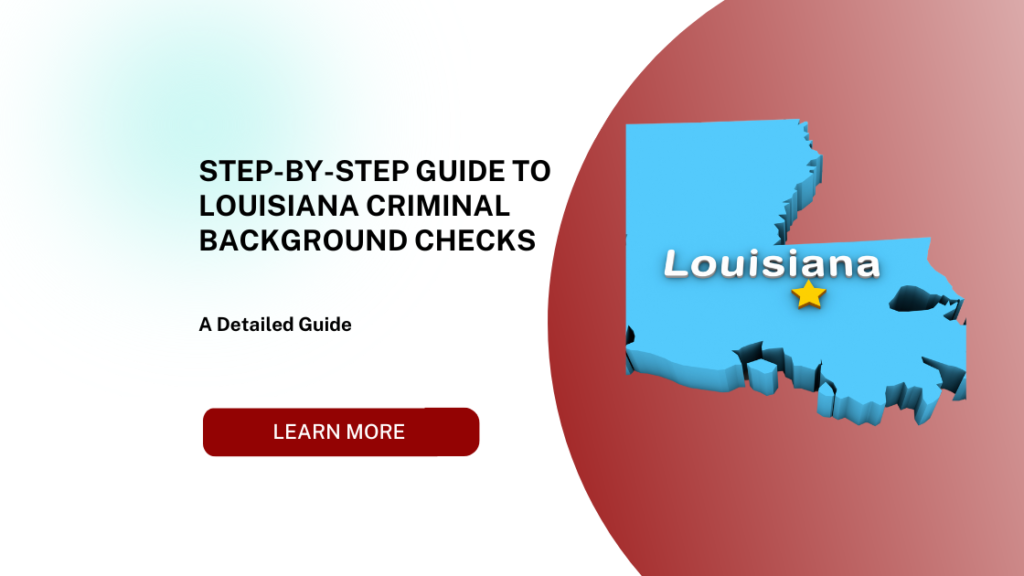
Overview of Criminal Background Checks in Louisiana
A criminal background check in Louisiana is a process used to investigate an individual’s criminal history, including any felonies, misdemeanors, arrests, or convictions. This process is essential for verifying the criminal record of an individual, particularly in situations where safety and trust are crucial, such as employment, housing, or licensing.
Criminal background checks are widely used across different sectors, including businesses hiring employees, landlords screening tenants, and governmental agencies conducting background investigations for various licenses or permits. In Louisiana, the check can reveal a person’s criminal history within the state or on a federal level, depending on the specific check requested.
Why Are Criminal Background Checks Conducted in Louisiana?
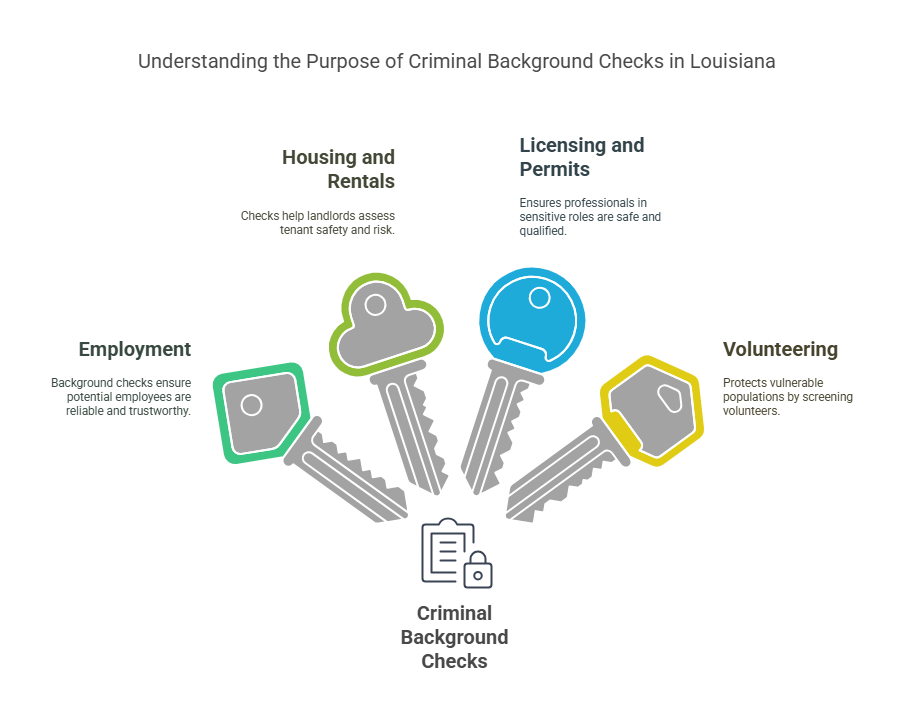
Criminal background checks in Louisiana are commonly conducted for various reasons. Understanding when and why they are needed is important for both employers and individuals. Here are some common scenarios:
- Employment: Employers often conduct criminal background checks as part of the hiring process to assess the character, reliability, and trustworthiness of potential employees. Positions in sensitive sectors, such as healthcare, finance, and education, frequently require background checks due to the nature of the work involved.
- Housing and Rentals: Landlords and property managers often conduct criminal background checks to assess potential tenants’ criminal histories, especially when renting properties in high-crime areas or where safety is a concern. This helps ensure that individuals who pose a risk to the property or other tenants are not admitted.
- Licensing and Permits: Certain industries in Louisiana, such as healthcare, law enforcement, and financial services, require professionals to undergo a criminal background check before they can obtain a state license or permit. The check helps ensure that individuals holding these positions do not have a criminal history that would pose a risk to public safety.
- Volunteering and Other Background Checks: Criminal background checks may also be conducted for volunteers, especially in organizations working with vulnerable populations like children or the elderly, or for gun permits and other government-related processes.
How Criminal Background Checks Help Employers and Organizations
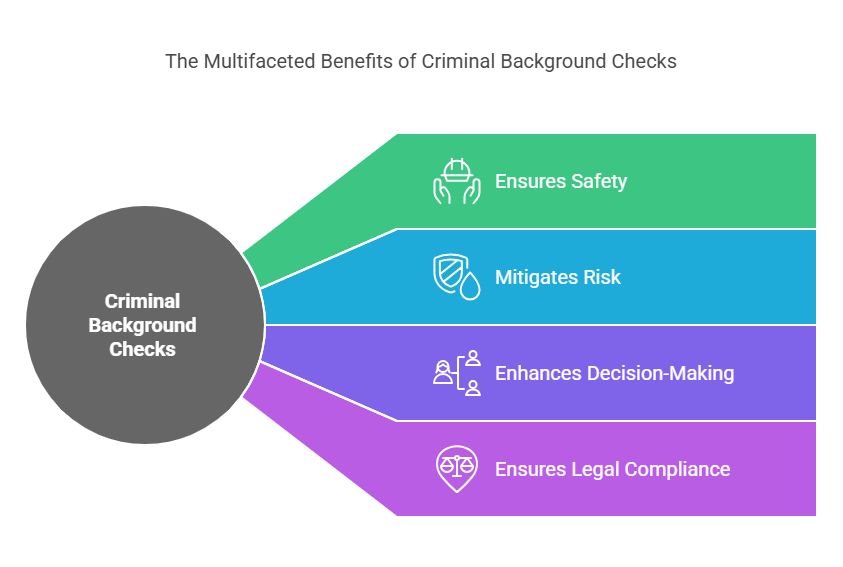
Criminal background checks are essential for employers, landlords, and organizations in assessing the risk posed by an individual in a given position. For employers, performing background checks:
- Ensures Safety: By identifying individuals with criminal histories, especially violent crimes or theft, employers can take proactive steps to avoid hiring individuals who might pose a safety risk to colleagues or clients.
- Mitigates Risk: Hiring someone with a criminal history in a sensitive position could lead to liability issues. Background checks help reduce this risk by providing detailed criminal history reports.
- Enhances Decision-Making: Employers can make more informed hiring decisions by reviewing an applicant’s criminal history in conjunction with other factors, such as skills, qualifications, and references.
- Ensures Legal Compliance: Many industries require criminal background checks to meet compliance standards, reducing the risk of lawsuits for negligence or hiring violations.
Key Entities and Databases Involved in Criminal Background Checks in Louisiana
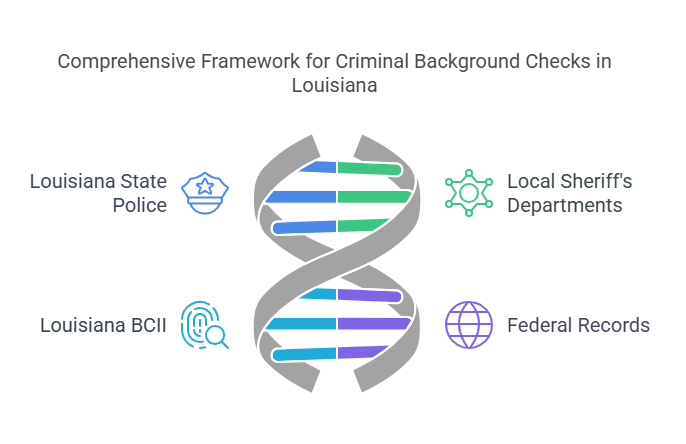
In Louisiana, several entities and databases are involved in the process of conducting a criminal background check. Here is a breakdown of key organizations that play a role in this process:
- Louisiana State Police (LSP): The Louisiana State Police operates the Criminal Records Unit, which maintains a centralized repository of criminal history records within the state. This is one of the primary sources for state-level criminal background checks.
- Local Sheriff’s Departments: Each parish (county) in Louisiana has a sheriff’s department that maintains records of arrests, bookings, and investigations within that jurisdiction. Some checks may need to be done directly with the local sheriff’s office for more granular information.
- Louisiana Bureau of Criminal Identification and Information (BCII): The BCII is part of the Louisiana State Police and is responsible for conducting background checks at the state level. It maintains comprehensive records on criminal activity, including felony convictions, arrests, and other relevant information.
- Federal Records: For federal-level background checks, the Federal Bureau of Investigation (FBI) is often involved, particularly when looking for crimes that occurred outside of Louisiana or across multiple states.
Steps Involved in Obtaining a Criminal Background Check in Louisiana
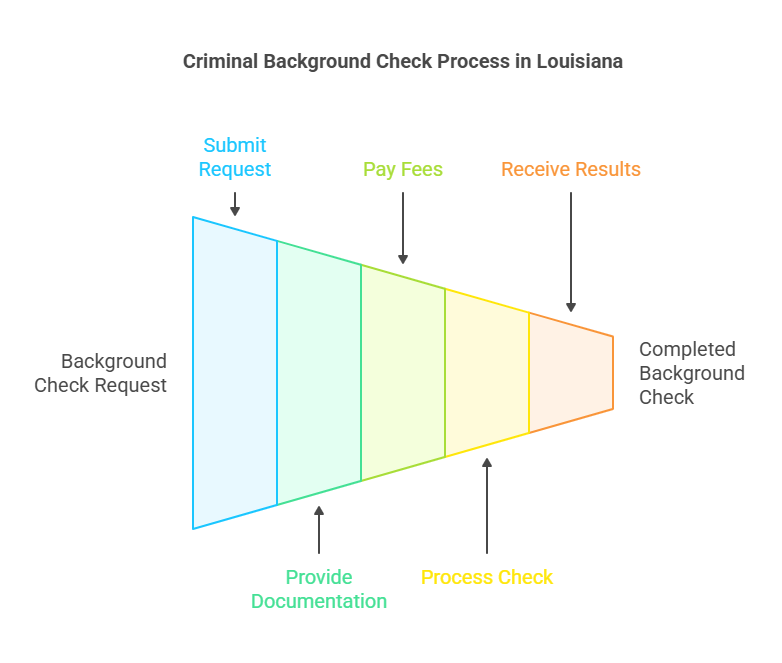
The process of obtaining a criminal background check in Louisiana involves several steps, and understanding them can help individuals and employers navigate the system efficiently. Below is an outline of the steps involved:
- Requesting the Check: The first step is submitting a request to the Louisiana State Police or local sheriff’s office. Many organizations allow individuals to request their own background checks, while employers or agencies can also request checks on behalf of others with the proper consent.
- Required Documentation: When submitting a request for a criminal background check, individuals will need to provide identifying information, such as:
- Full name
- Date of birth
- Social Security Number (optional, but can speed up the process)
- Fingerprints (for more comprehensive checks, like for employment in certain fields)
- Fees: There is typically a fee associated with criminal background checks in Louisiana. The cost varies depending on the type of check (state vs. federal), the entity conducting the check, and whether fingerprints are required. On average, the fee for a basic state criminal background check is between $25 and $50, though additional costs may apply for more detailed checks.
- Processing Time: The processing time for criminal background checks can vary depending on the type of check being requested. A basic background check from the Louisiana State Police may take anywhere from 5 to 10 business days. However, if fingerprinting is required or if the check needs to be submitted to the FBI for federal records, the processing time could be longer, potentially up to several weeks.
- Receiving Results: Once the criminal background check is processed, the individual or employer will receive the results. This can include information on any felony or misdemeanor convictions, arrest records, or pending charges, depending on the scope of the request.
Process of Criminal Background Checks in Louisiana and Available Services
The Criminal Background Check Process in Louisiana
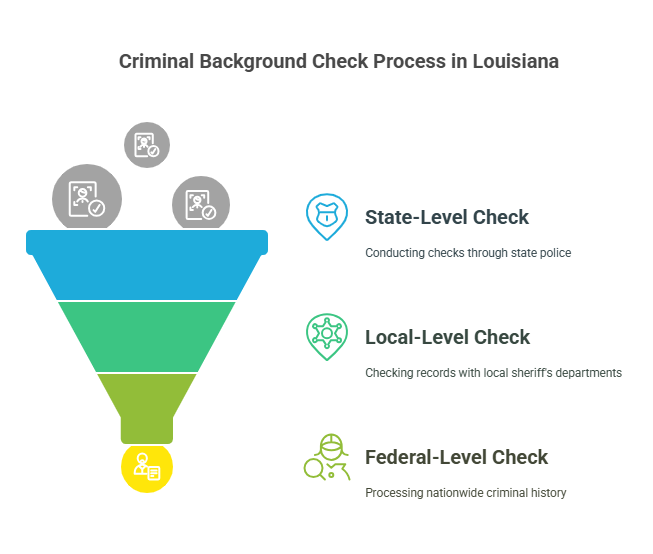
The process of conducting a criminal background check in Louisiana involves several steps, depending on whether the check is state-level or federal. Here’s a detailed breakdown of the steps involved in obtaining a criminal background check:
1. State-Level Criminal Background Checks in Louisiana
The majority of criminal background checks in Louisiana are processed at the state level. The Louisiana State Police manages the central repository of criminal records through the Criminal Records Unit. Here’s how the process works:
- Request Submission: Individuals or employers can request a criminal background check either online through the Louisiana State Police website, via mail, or in person at the designated office.
- Required Documents: To process the check, applicants need to provide identifying information such as their full name, date of birth, and sometimes a Social Security Number. In some cases, fingerprints may be required to verify identity or conduct more thorough checks.
- Processing: Once the request is submitted, the State Police will check the database for any criminal history tied to the individual. This process typically takes 5 to 10 business days, but can be expedited in certain cases for an additional fee.
- Results: The results will include criminal history information, such as arrests, charges, and convictions, if applicable. If no criminal record exists, the report will indicate that as well.
2. Local Sheriff’s Departments and Parishes
For more localized information, especially regarding recent arrests or issues within a specific jurisdiction, criminal background checks can be conducted through local sheriff’s departments or parish law enforcement agencies. The process may vary slightly by location, but typically includes:
- Request Submission: Individuals or employers can submit a request to the sheriff’s department or local law enforcement agencies.
- Records Access: Local departments may only provide records for crimes that occurred within that specific parish, meaning that individuals or employers may need to submit requests to multiple sheriff’s offices if they suspect the individual has committed offenses in various areas.
- Fees and Processing Time: Fees for local background checks are typically in line with the state’s fees, but some parishes may have different pricing structures. Processing time can also vary from a few days to a few weeks, depending on the department.
3. Federal-Level Criminal Background Checks
In some cases, employers or agencies may require access to federal-level criminal records, especially if the individual has committed crimes across state lines or if the individual is applying for a federal job or clearance. Here’s how the federal criminal background check works:
- Request Submission: Federal criminal background checks are typically processed through the Federal Bureau of Investigation (FBI). These checks require fingerprinting, which can be submitted either directly to the FBI or through an authorized channeler.
- Scope of Information: A federal check provides a nationwide criminal history, which includes federal crimes, and it often takes longer than a state-level check, sometimes requiring several weeks to process.
- Cost: The cost for a federal criminal background check is generally higher than a state-level check, ranging between $18 to $50 depending on the processing method and the third-party service provider used.
Types of Records Checked in Louisiana
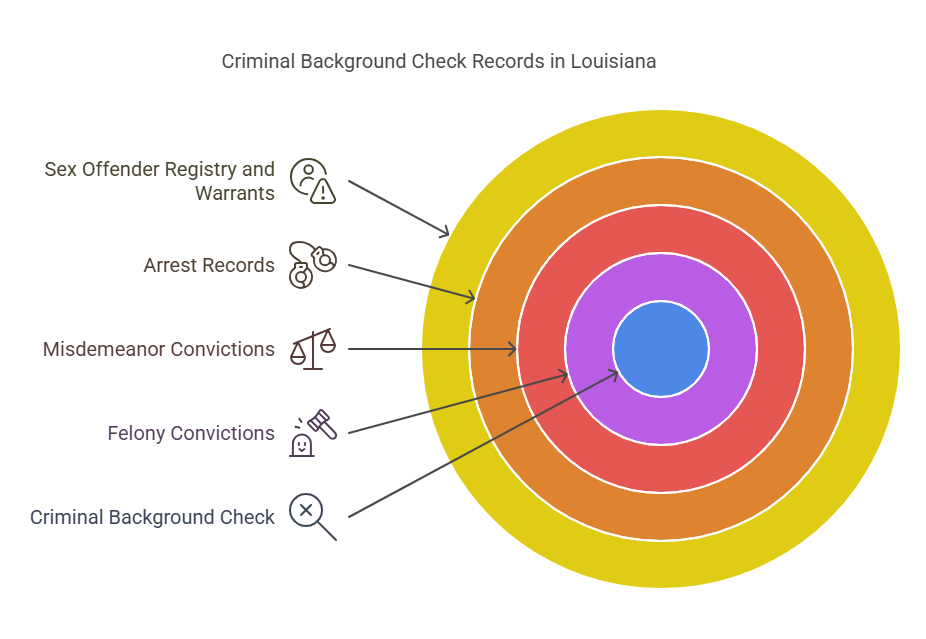
When conducting a criminal background check in Louisiana, there are several types of criminal records that may be examined. The exact records reviewed depend on the scope of the check (state, federal, or local) and the specific requirements of the request. Below are the most common records reviewed:
- Felony Convictions: Felonies are serious criminal offenses, such as murder, theft, or drug trafficking, that are typically punishable by long-term imprisonment. A criminal background check in Louisiana will list any felony convictions, which may be a significant factor for employers or landlords.
- Misdemeanor Convictions: Misdemeanors are less severe offenses but still represent criminal behavior. Examples include minor theft or simple assault. These records will also appear on a criminal background check.
- Arrest Records: Even if a person is not convicted of a crime, their arrest record may appear during a background check. This can be a concern for employers or landlords, especially if the arrest was related to violence or dishonesty.
- Sex Offender Registry: Louisiana maintains a statewide sex offender registry, and individuals convicted of sexual offenses are required to register. This registry is public and can be checked during the background verification process.
- Warrants: In some cases, active arrest warrants may be discovered through a background check, depending on the database and the level of search requested.
- Pending Charges: In some cases, criminal background checks can reveal pending charges that may not yet have led to convictions. Employers and landlords may take these charges into consideration, especially if they pertain to serious offenses.
Public vs. Private Background Checks in Louisiana
There are two primary types of criminal background checks in Louisiana: public and private. Understanding the differences between the two is essential for both individuals and employers.
- Public Background Checks: Public background checks are typically available to anyone. The information is part of public records, such as arrest reports, court cases, and some criminal convictions. In Louisiana, records maintained by local sheriff’s offices or court systems are public, meaning anyone can access this information, though there may be some restrictions on the type of data released.
- Private Background Checks: These are conducted by third-party agencies and often involve more detailed searches across multiple databases, including state and federal records. These checks are often used by employers, landlords, and other entities to obtain a more comprehensive view of an individual’s criminal history.
Employers and organizations are generally more concerned with private background checks, as they provide a more complete record of an individual’s criminal history. However, for individuals looking for their own criminal history, a public background check may suffice.
Impact of Criminal Records on Employment, Housing, and Opportunities in Louisiana
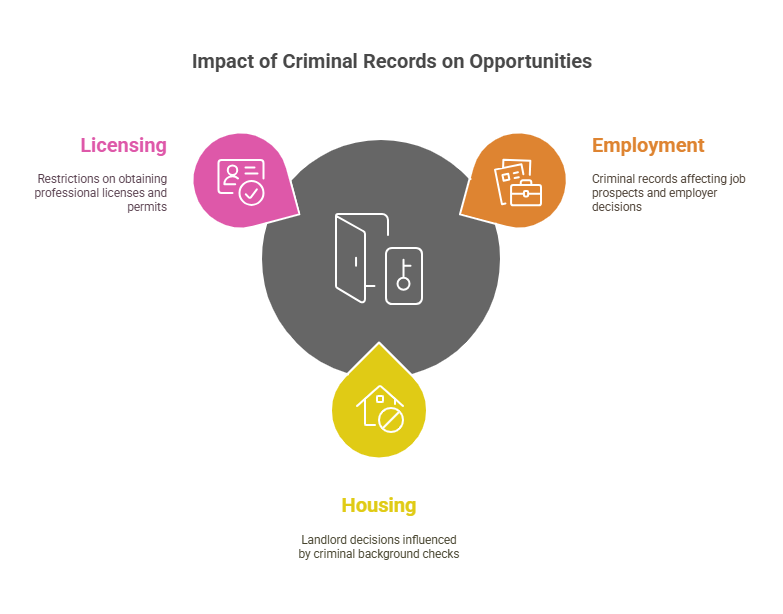
Criminal records can have a significant impact on an individual’s opportunities for employment, housing, and other aspects of life in Louisiana. Here’s a breakdown of how criminal records may affect different areas:
- Employment: Certain jobs, especially in sensitive sectors like healthcare, education, or finance, may require a clean criminal record. Employers can use criminal background checks to assess whether an applicant poses a risk to workplace safety, company reputation, or customer trust.
- Housing: Landlords may choose not to rent to individuals with a criminal background, especially if the offense was violent or if there is a history of property damage or theft. Louisiana law allows landlords to deny rental applications based on a criminal record, although discrimination based solely on arrest records is restricted in certain cases.
- Licensing and Permits: Criminal records can also affect an individual’s ability to obtain various licenses or permits in Louisiana. Professionals in certain industries may face additional scrutiny or be disqualified if they have criminal histories, particularly in fields such as law enforcement, childcare, or healthcare.



